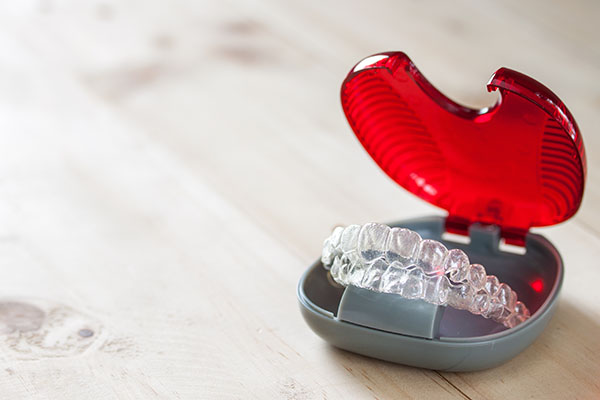 In recent years, Invisalign® has become increasingly popular to straighten misaligned teeth. There are many benefits of this type of orthodontic treatment over traditional braces. Patients can remove the aligners to brush and floss the teeth, making oral hygiene measures much easier. Treatment time is often shorter, and the clear trays are not as noticeable as metal braces. As with braces, though, patients must wear retainers after completing the treatment.
In recent years, Invisalign® has become increasingly popular to straighten misaligned teeth. There are many benefits of this type of orthodontic treatment over traditional braces. Patients can remove the aligners to brush and floss the teeth, making oral hygiene measures much easier. Treatment time is often shorter, and the clear trays are not as noticeable as metal braces. As with braces, though, patients must wear retainers after completing the treatment.
Retainer instructions after Invisalign® treatment
Patients must be diligent about wearing retainers after Invisalign® treatment. Otherwise, teeth may shift and become misaligned again. After completing orthodontic treatment, the last thing anyone wants is to have to start the process over. Retainers are a great tool for preventing this.
Wear nightly
After any type of orthodontic treatment, a patient must wear retainers nightly. These are usually clear trays that snap onto the teeth to hold everything in position. The retainers are very similar to Invisalign® trays. In fact, the patient may use the last set of aligners as retainers. This is another benefit of this treatment over regular braces — patients are already used to wearing and sleeping in this type of device.
Clean daily
Because saliva flow is reduced at night, bacteria thrive in the mouth during this time. Therefore, retainers must be cleaned well each day. Brushing the retainers with a toothbrush is usually sufficient. The main goal is to remove plaque and bacteria from the trays. If one does not clean the retainers daily, the trays become cloudy or stained over time. Ideally, one should clean the trays twice a day, in the morning and at bedtime.
Replace as needed
Retainers are not meant to last forever. If the patient has any type of dental treatment done, a new set of retainers may be needed. A new crown or filling can change the fit of a retainer, so it is often better to get a new set made. Patients who suffer from teeth grinding may need to replace retainers on a more frequent basis because the plastic may become worn over time.
Retainers also need to be replaced if they become cracked or broken because the fit will change. Patients may choose to replace retainers that get stained over time, and patients may want a spare set in case the retainers are lost. Patients should always discuss retainer care and replacement options with the orthodontist at the end of treatment.
Conclusion
Invisalign® is a great treatment option for patients who want to correct teeth alignment problems. To maintain results, patients need to wear retainers and know how to care for them. Patients should be used to wearing aligners at night, so the transition to wearing retainers can be a relatively smooth one. Retainers keep a patient's orthodontic results stable over time. When patients are fully compliant with care after treatment, they can enjoy a beautiful smile for years to come.
Request an appointment or call Diamond Head Dental Care at 808-450-2101 for an appointment in our Honolulu office.
Recent Posts
There are many benefits to choosing Invisalign® clear aligners over metal braces for teeth straightening, including the ease of cleaning and routine maintenance. While clear aligners are considered more aesthetically pleasing than traditional braces, failing to take proper care of the trays can lead to discoloration or a buildup of bacteria in the mouth. Fortunately,…
Invisalign® and braces are very different tools that can give patients an even smile with straightened teeth. Because patients must wear teeth alignment devices for a while, you might wonder if you will need repairs to your device. Patients often wonder if one type of device needs more repairing than another. For most patients, one…
There are so many differences between traditional braces and Invisalign® aligners. You may be wondering which option is right for your alignment needs and if you will have to change your lifestyle. Many people choose to go through the Invisalign process because the trays are less conspicuous than traditional braces. Traditional braces can be very…


